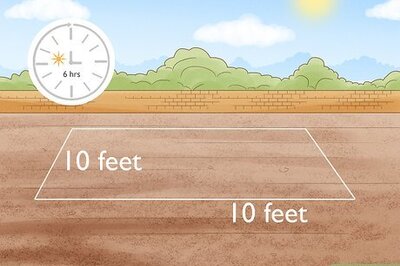
views
Disciplining a 2-3 Year Old

Praise your child for good behavior. Shaping your child’s behavior in a positive way should be your first line of defense against bad behavior. If you see your child helping their sibling or cleaning up their toys, then encourage the behavior with praise. For example, you might see your child picking up their blocks and putting them away. In this case, you could say, “Wow, you’re doing a great job putting your toys away. Thank you!”

Utilize time-out. While the actual concept behind time-out is not really going to sink in for a 2 year old, time-out at this age can be useful for separating the child from the situation they're in. For instance, if you see your child throwing food at your pet, you’ll need to stop them immediately. Putting them in a safe time-out place like a high chair or crib will stop the behavior and also give you time to clean up or make corrections to the situation as needed. Do not send your child to their room. Doing so will create a negative association for the child by linking their bedroom with punishment.

Be consistent with your discipline. Because your child is young, your toddler will not understand most rules and demands. But when you do set rules, make sure that you apply them evenly. If you’re in a two-parent household, consult with your partner to ensure you both apply the same rules in the same way. For instance, do not allow a child into the office or near the stairs when you’re home if your partner does not.
Redirect them if they are trying to do something you don't want them to do. Children between the ages of 2 to 3 years old are curious and they may try to investigate things that they shouldn't. Telling them no may result in a tantrum, or they may just keep trying to do it! You may need to redirect them with another object or activity that is appropriate. For example, if the child keeps trying to open the kitchen cupboard door, then you could redirect them to a favorite toy.

Explain your rules with simple language. Do not give long explanations as to why a rule exists. For instance, if you don’t want your child near the stairs, don’t say, “If you play near the stairs there is a chance you might tumble down them and hurt yourself.” Instead, simply say, “Let’s not play near the stairs.” The reasoning behind your rule is, at this point, uninteresting to the child. When your child starts asking “why”, you’ll know your child is ready for longer answers. Squat down to your child’s level when explaining a rule or situation to your child. Stay calm. Do not yell or scream at your child. Keep in mind that your child does not have the cognitive capabilities to distinguish right from wrong, or understand many rules. Yelling at your child will not help them understand the situation, it will only scare your child. When you feel frustrated, try to take a few deep breaths, inhaling for three to five seconds, then exhaling for an equal amount of time.
Disciplining a 4-7 Year Old

Set clear rules. Beginning at age four, children can begin to understand and comply with your rules. For example, you can set a rule that if your child wants to paint, then they have to wear an old shirt or an apron over their clothes to protect the clothes from paint. Make sure that you explain the rule to your child and remind them about it the first few times they want to paint. For example, after you have explained to your child that they must wear an old shirt or apron before they start to paint, you might just remind them by saying, “What special thing do you have to put on before you can start painting?” After a few times, changing into an old shirt or apron should become automatic for your child.

Be consistent when applying your rules. If you apply the rules in one situation but not in another, your child will be confused. In order to make the rules you set work, be consistent with your rules in different situations. For instance, if you tell your child not to watch TV until after they eat dinner, but they turn the TV on anyway, you might discipline them by making them take a time-out. If they watch TV before dinner the next day, make them take another time-out. Administering the same punishment for the same offense every time ensures your child will get the message that you are displeased with their behavior.

Be patient when explaining your rules. Kids two and up can understand simple reasoning as long as you explain your rules in a way that they understand. For example, if you set a rule that your child must clean up their toys right after they finish playing and they want to know why this is the rule, then you might say something like, “Because it is important to take care of your things. By leaving your toys out, there is a chance that someone could accidentally step on one of them and break one of your toys. But if you put your toys away, then you can keep them safe from those kinds of accidents.” Explain your rules in simple language. After you give a child a rule, make them repeat it back to you in their own words. Prompt them to tell you what you asked for by asking, “Do you understand?” If they say that they do, ask “What do I want you to do?” If they can, in their own words, successfully explain your expectations, then you’ve crafted a good rule and explained it to your child adequately. If your child cannot explain a rule back to you accurately, perhaps your rule is too complex. Try a simpler rule and let them grow up a bit before instituting rules which they cannot reproduce in their own words.
Be firm with your child. Do not give in to whining or complaints. If you let your child do whatever they want, they will learn that whining will allow them to get their way, and they will use it to their advantage in the future. For instance, if your child says repeatedly, “I want to play outside,” but it is time for dinner, you need to insist that they can only play outside when you allow it.

Don’t discipline every atypical behavior. Sometimes, parents perceive their child’s innocent offense as deliberately intended to irritate or cause mischief. In fact, many children only learn how to explore the world around them through misbehavior. For example, if your child starts drawing all over the walls, they might not know that such a behavior is inappropriate. You might rightly be upset that your child has engaged in such a behavior, but try to empathize with your child and look at the situation from their point of view. If you have never set a clear rule that it is not okay to draw on the walls, then your child may not have known that drawing on the walls was inappropriate. When your child does act inappropriately, make it clear that you do not want your child to repeat that behavior. Offer a substitute activity, such as drawing on a piece of paper or in a coloring book instead of drawing on the walls. You could also get your child to help you clean the mess up. You do not, however, need to yell at or punish your child for doing something that they did not know was wrong.

Express empathy and love. When you begin to discipline your toddler, always emphasize that you’re acting out of love. Let your child know that you care for them by saying something like, “I know you want to walk downstairs, but it is not safe for you to go there yet.” Give your child a hug and kiss to show that the limits you set are there for their own safety and welfare. Understanding that most of the trouble your young child gets into is the result of them being naturally curious, not bad or willfully misbehaving. Understanding your child’s mental development will help you see the world from your child’s eyes a bit more, and inspire you to treat your child with greater empathy. Don’t be afraid to say “no.” You’re the parent and must govern your child’s behavior.

Create a distraction for your child. By creating a distraction for your child, you can redirect their energy in a positive way. Think about the situation that you and your child are in and look for creative alternatives that your child could engage in. For instance, if your child starts throwing a tantrum in the supermarket because you won’t buy their favorite cereal, then you might ask for their help in finding other items on the shopping list. Or, if your young child is playing near a fragile vase, you should offer them a toy or pad of paper and some crayons to get them to move away from the vase and sit quietly for a bit. This tactic is primarily intended for children aged six to 24 months old but works well for children of up to five years old.

Try a time-out. A time out consists of forcing the child to sit in a certain place for a given amount of time, generally one minute for every age of life. For instance, if your child is five, they should take a time-out for five minutes in the event of misbehavior. Time-out is an appropriate form of discipline for children up through elementary school age. Choose a time-out location free of distractions like TV, books, toys, friends, or games. The purpose of the time-out is to provide space for the child to reflect on their actions in a quiet moment. A kitchen chair or a bottom stair is an appropriate spot for sitting a toddler up to two years of age for a time-out. Time-out is a good form of discipline when a child has broken a rule or done something dangerous. For instance, if you’ve told your child not to play in the street and they do so anyway, send your child to time-out. Don’t speak to your child when they are in time-out. If you have a moralistic message you want to impart to your child, wait until they have completed the time-out. Even if your child starts crying or wailing, don’t acknowledge your child until the time-out is through. Alternatively, try a time-in. Time-ins can help your child feel better and know what they did was wrong. Take the time to talk to your child, and let them cool down if they get angry.

Remove your child’s privileges. For instance, if your young child constantly and deliberately breaks toys, you might take away all remaining (unbroken) toys for a period of time. Explain to your child before doing do so that if they wish to remain in possession of toys, they'll need to take better care of the toys. For young children, especially, ensure that you take away privileges as soon as you notice the undesirable behavior. This creates an association in the child’s mind between the behavior and the loss of the privilege. Do not take away privileges for a long time. Children at a young age often lack the long-term concept of time that older children and adults do. Taking a young child’s toys away for a week might seem fair, but the impact will be lost after several days.

Reward good behavior. Whether your child is very young or already a teenager, rewarding good behavior is a must. For toddlers and very young children, reward them with verbal praise or a small, colorful sticker. Shaping positive behavior at this young age is more effective than punishment. For instance, praise a child who shared a snack with a friend, even when they were not asked to do so. Reward your child with a piece of candy or the chance to watch their favorite show longer than they normally might. Choose a reward which corresponds proportionally to the positive behavior the child demonstrated.

Help your child understand natural consequences. This means that when your child takes a certain action, they can expect a certain result. Natural consequences help children understand that they must take responsibility for their actions and exercise judgment. For example, if your child does not put their bike away after they are done riding it, then it is possible that the bike will start to rust or possibly even get stolen. If they leave their bike outside despite the risks, then this might be an opportunity to teach your child about natural consequences. If/then statements are good when explaining natural consequences to children. For example, you could say, “If you leave your bike out in the driveway, then it might get stolen or start to rust.” Do not use natural consequences in situations that might compromise your child’s safety or well-being. For example, when the weather is cold, do not send your child outside without a coat if they do not want to wear one. Or, if you catch your child playing with matches, do not allow your child to continue playing with the matches. Your child might burn themself or set fire to your home.

Be reasonable when disciplining your child. It is important to be reasonable when you respond to your child's behavior. Do not overreact to things that your child does or expect your child to know how to do something that they have not learned about yet. For example, if your three year old knocks over a glass of juice, don’t expect them to clean it up all alone. Instead, help your child and say “We need to clean this up now. Let’s learn how to clean up a mess up together.” Give your child a rag or napkin and insist that your child help you clean up. Show your child how to clean the mess and give your child tips as they do so.

Create a schedule. From the age of six months and up, give your child a regular routine. For instance, a six-month old might begin each day with a wake-up time at 8:00, breakfast at 9:00, play time until lunch at 12:00, a nap at 1:00, and a 7:00 bedtime. As children age, push bedtime back and provide more freedom in deciding how to use their time. Getting an early understanding of how to structure and manage one’s time will give children an advantage when they enter grade school. If you do not set a schedule, on the other hand, you will open yourself up to constant negotiation with your child about when an appropriate bedtime, wake-up time, lunch time, and so on. If you have multiple children of vastly different ages, you should give each a separate bedtime. This will not only accommodate each child’s different physiology and natural sleep cycles, but it will also give you private time with each of them when you tuck them in at the end of the night. If your children are very close in age (within four years of each other), though, you might think of letting them have the same bedtime schedules to prevent sibling rivalry.
Disciplining an 8-12 Year Old

Maintain a strong bond with your child. As your child grows, it becomes harder to discipline them as you did when your child was younger. Punishment or the threat of punishment will only go so far; a better solution to ensuring your child’s good behavior is to stay connected and encourage your child to act properly through positive reinforcement. Ask your child what they are doing in school, and if they have a favorite class. Take an interest in your child’s life. Invite your child to go out with you on errands or family activities like a walk in the park, or even just a walk around the neighborhood. While it can be hard to connect with children at this age, who might have soccer practice or after-school clubs to attend, make time to chat with your child for at least a few quiet minutes each day. Sitting with your child while they are free of distractions right before they go to sleep is a good option. Model the behavior that you expect. If you say you’ll do something, do it. Don’t use profane language if you tell your child not to. Children copy what they see their parents do; if you act well, you will provide a positive model for your child to emulate.

Be reasonable when setting rules. It is important to understand that 8 to 12 year olds are changing and becoming more independent. While your child still needs you, they might feel stifled by rules that were necessary when your child was younger. Compare your rules with those of other parents in order to gauge what a reasonable bedtime is, or how much TV your child should watch. If your child has their own phone or computer at this age, set limits but allow your child some freedom. For instance, you might forbid using the phone at the dinner table or after a certain time in the evening. Continue to monitor your children at this age. If your child likes playing outside with their friends, you can let your child do so but insist that you or another adult be present to supervise. Work with your child and listen to what they are feeling and thinking. If your child is frustrated by a given rule, acknowledge your child’s point of view and (if reasonable) consider changing the rule to provide greater leniency.

Ensure the punishment is appropriate. If you take away a book that your child has no interest in, you haven’t really punished your child at all. On the other hand, if you ground your child for a week just because they arrived late to the dinner table, the punishment exceeds the severity of the infraction. Discipline your child in a fair, balanced way. Talk with your spouse or with other parents in order to find the best punishments for your child.

Stay calm. Don’t yell at your child or say things that will humiliate or embarrass them, or cause your child to react negatively. When you decide to discipline, do it in a way that is private and respectful. For instance, if your child says something rude about another person in public, pull your child aside and let them know that they should not say those things where the person might hear them. Children at this age can begin to feel intense social pressures, and may begin to experience hormonal changes. These influences can create an emotional cocktail within your child that results in tantrums or tearful frustration. Do not respond to these episodes with an equal volume of emotion. Instead, ask your child to leave the room to calm down. If you’re in your child’s room, ask if your child wants you to leave. Talk to your child about the outburst later when your child has calmed down. Ask, “Do you think your tone and actions earlier were acceptable?” Insist that your child apologize when yelling or succumbing to emotional outbursts. If your child insults you or says “I hate you,” don’t take it personally. Understand that your child is trying to goad you into reacting angrily. Stay calm and later, when your child has calmed down, tell your child that what they said really hurt your feelings. Ask your child if they think they should apologize, but even if they do not, tell your child that you forgive them anyways. Express that you expect them to always be respectful and kind to others -- including you -- even when they are angry.

Reward good behavior. If you see your tween child doing something kind or proactive -- for instance, picking up their things when they were not asked to, or getting their homework done without your urging, a reward is an appropriate response. Consider rewarding your tween child with TV time or the opportunity to have a friend spend the night. For middle or high-school aged children, you might allow them to stay out a bit later than they are normally allowed to when they finish their homework. Good behavior varies depending on the parent-child relationship. If your idea of good behavior is to have your child in bed each night by 9:00, let your child know this in advance. When your child is in bed at 9:00 each night for a week, administer a reward of your choosing, such as a trip to the ice cream parlor or arcade.

Don’t protect your child from natural consequences. Natural consequences are those which are produced as a direct result of an individual’s actions. For instance, a natural consequence for a child 8-12 might be that they left their book at a friend’s house, and cannot read it. Another natural consequence for a tween or teen might be that they got mad and threw their phone. Instead of punishing the tween, inform them that with the phone is broken, and they now have no way of contacting their friends online. Always emphasize to your child how they experienced natural consequences when your child’s actions allow for it.

Help your child learn self-discipline. Maintain healthy, open communication with your child as they grow. Instead of punishing your child as you would have when they were younger, show them when their behavior needs to change in order to make their life better. For example, perhaps your child struggles to catch the bus on time and is thus always late to school. Instead of instituting a punishment (“If you do not get up on time to catch the bus, I will take your games away”), approach your child about the issue with concern. Tell your child, “I’ve noticed you’re having trouble getting to the bus on time. This will affect your grades if it continues. What do you think you can do to get out the door on time?” Your child might suggest setting her alarm for an earlier time or putting their clothes and backpack out the night before. You can help your child come up with ways to get set up, but you should allow them to do these things themself to work on their self-discipline.

Encourage your child to reflect on their mistakes. Good discipline involves not just punishing or demonstrating how your child’s actions have brought about certain consequences, but showing your tween the possibility of other courses they could have taken and might take in the future. For instance, if your child got a low grade in school, ask them why they think that happened. Perhaps they will reply that they consistently put the assignment off until it was too late for them to finish it in a timely manner. Invite your child to think about things they could do which would have produced a more positive result. For example, you might ask probing questions like, “Why do you think you put it off for so long?”, “What could you have done to motivate yourself better?”, “Are you happy with the grade you got? Why or why not?” Asking your tween to think about the outcome of the situation is important to help them realize that they are responsible for their own life. Always ask if there is anything they want you to do for them in the future to ensure that they do not make similar mistakes. Showing your child that you are there for them will ensure that they feel cared for and loved no matter what mischief they have engaged in.
Disciplining a 13-17 Year Old

Include teens in the rule-making process. Ensure your teen feels like they are participating in the rule-building process. Don’t let them have the final say or craft their own rules entirely, but let them know that you’re aware that they are growing up and deserve more autonomy. For example, you might let your teen stay out later on weekends. When allowing them to do so, do not vaguely say “Don’t stay out too late.” Instead, let them know exactly when you expect them to be home. “Be home at 10:00” is a good directive when setting a curfew. When they get their driver’s license, you might let them drive on their own over short distances, then allow longer trips as they gain more experience on the road. Staying connected to your teen can be hard. Teens typically do not want to bond with their parents, but by acknowledging their perspectives and desires, you can help you maintain a strong relationship with them. Bringing your teen into the disciplinary process shows that you respect their burgeoning independence, and they may appreciate this (even if they do not admit it).

Let your teen know what your zero-tolerance policies are. While a great deal of teen discipline relies on negotiating with your teen in order to reach a win-win situation, there are some things you need to hold the line on. For instance, you might insist that your teen never drinks, does drugs, or brings friends over to the house when you or another adult is not home. Let your teen know these are unacceptable and nonnegotiable. If your teen violates one of your hard rules, your response can vary. You should first ask your teen if they know that you’re uncomfortable with the fact that they broke the rule in question. Talk to them in a clear, calm way about why you have insisted upon the given rule. For instance, if you tell your teen not to drink, you might explain before and after they do so that drinking could lead to being taken advantage of, humiliated, or driving drunk and getting seriously hurt or hurting someone else. If your teen refuses to abide by your rules, start with a form of discipline such as grounding and/or taking away a privilege like the car keys, computer, phone, and/or tablet.

Set a schedule for your teen. Teens are often very busy with school, a part-time job, and/or commitments to a team or club. Help your teen organize their time with a set schedule, but do not let your teen completely set the terms of their schedule. For instance, do not allow your teen to go to soccer practice if they have not completed their homework or are not performing well in school. Let your teen know that while you support their extra-curricular activities, they must maintain good grades and commit to the curfew you set. Do not accept your teen being out all night. Teens will do better with later wake-up times and earlier bedtimes. Ensure that your teen gets 8 to 10 hours of sleep each night. Unfortunately, the school year dictates your teen’s wake-up time for most of the year. Allow your teen to sleep in on weekends if possible. Invite your teen’s feedback on their schedule and ask about their peers’ schedules to see if the one you’ve crafted is too strict. If your teen has trouble sticking to their schedule, type it up and post it in a visible place like on the fridge so your teen can consult it as needed. Let your teen know that failure to adhere to the schedule will result in a particular disciplinary behavior. Always follow through on your disciplinary action after explaining the consequences to your teen.

Remind your teen of natural consequences. Your child should, by the teenage years, understand natural consequences. At this stage, allow your teen to make rational and reasonable dress decisions. If your teen refuses to wear a coat, and is then cold whenever they go outside, draw attention to their feelings of discomfort and coldness as a natural consequence of their actions.

Take away privileges. If your teen acts up, you might need to take something they value away for a period of time. Removing the right to watch TV -- including shows on the phone or tablet -- is a good starting point. You might also disallow your teen to go out with their friends. Removal of privileges works best when the privilege being revoked is in some way related to the offense. For instance, if you tell your teen to stop watching TV and do their homework, and they refuse after being asked to do so multiple times, you would be wise to suspend TV viewing for at least 24 hours. Distinguish between privileges and needs. Restricting access to food and hygiene is never okay, and being kind to your teen is not a privilege to be taken, but rather a necessity for their wellbeing.

Discuss issues with your teen. If your teen breaks a rule or does not do something that they are supposed to do, then it is important to have a discussion with your teen. Discussing issues will help you to understand your teen better and it will also help to reinforce the rules that you have set. Avoid jumping straight to punishment. Instead, ensure that your expectations are clear and look for ways to support your teen. For example, if your teen has been finding ways to get out of doing the dishes, then sit down and talk about it. You might explain that everyone has responsibilities and it is important to meet them even if they don’t always feel like it. You might provide an example for your teen, such as “What if I stopped going to work and we didn’t have any money to pay for food or clothes?” You might also explain to your teen why it is important for them to do the dishes. You could say something like, “We all help out to make dinner time a family effort. Your father cooks dinner, your sister sets the table, and I tidy up the kitchen after he is done. Washing the dishes is your part in that effort and we need you to keep doing it." You might consider asking your teen if there is anything you can do to make doing the dishes easier on them. For example, they might be grossed out by touching the dirty dishes, so you could get a pair of gloves for them to wear. Or, they might feel like it is unfair that they always have to do the dishes, so you could rotate the chores. Instead of always doing the dishes, your teen could rotate between setting the table, tidying up the kitchen after dinner, or perhaps even making dinner for the family.




















Comments
0 comment